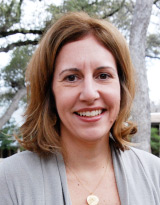In last month’s blog post, I mentioned an outfit in town called Typewriter Rodeo. The typewriter “cowboys” are poets. They sit at tables behind vintage typewriters and pound out poems on demand. Sometimes you can find the foursome at Book People, other times at private parties or at special events such as the Austin Mini-Maker Faire.
It works like this. After standing in line for a while—because these guys are popular—it’s finally your turn. You walk up to your poet, say a word or a phrase (chocolate, unicorns, skinned knees, Mario who isn’t here) and, if you wish, name a genre (haiku, limerick, sonnet), and then you stand back and watch ‘em go. Clackety clackety clack! Two minutes later, you hear the satisfying whrrrrrip of paper from rubber roller and are handed a custom poem in Courier 12. Sometimes, if you’re lucky, the poet illuminates the manuscript. Here is an example:

How cool is that?
Not only is it cool, methinks,
It also shows us how
A group of folks called Christians
Should seize the “here and now.”
Ahem. So, maybe I’ll never be hired in the “here and now” as a fifth Rodeo member. But I do think both the form and spirit of this group’s endeavor are worthy of our attention and emulation.
If you’ve spent any time at all on the campus of the Seminary of the Southwest, you know that hospitality is the name of the game. As you approach the “table” of campus, you are greeted—invited into relationship—not only by super-helpful humans but also by maternally arcing oaks, gently winding pathways, and soft streams of breezeway air (always the perfect temperature; have you noticed?). The seminary’s a hospitable place.
But the Typewriter Rodeo folks are more than hospitable—at least in the conventional sense of the word, the sense meaning “friendly, welcoming, open, and generous.” They don’t simply open themselves to requests for a glass of water or directions to the loo. They open themselves to requests for that which does not yet exist. They open themselves to absolute creative risk. They commit themselves to the making (in Greek, poiesis) of whatever someone asks of them—however ridiculous, however surprising—without judging or arguing or making better suggestions. They give themselves to the making of that which, five seconds ago, they never would have dreamed of making, simply because someone asked.
In his recent book The Insistence of God, theologian-philosopher John Caputo invites us to think of God precisely as the “someone asking,” or, even more precisely, as the something-within-the-someone-asking.1 “Hospitality is not a character trait of the pious,” he writes, “not just a virtue to be cultivated … but the field in which everything we do transpires.” Hospitality is how we bring God (the invitation itself) into this life. This whole project can be trouble, he admits. It can be full of incoming missiles. God can sometimes be an incoming missile. But if God-welcoming were risk-free, he says, hospitality wouldn’t be needed. “I pray the God who exposes me to trouble to rid me of the God who keeps me safe,” he says (echoing Meister Eckhart’s “I pray God to rid me of God”).
Saying yes to the radical invitation of God isn’t just a lovely gesture of generosity. It’s taking a risk, and it’s taking creative action. It’s saying yes to the strangest words and phrases that get thrown our way. It’s writing a poem. It’s making something out of whatever walks up to the table.
 Dr. Claire Colombo is the director of the Center for Writing and Creative Expression at the seminary and has served on the seminary’s adjunct faculty since 2012. As a freelance writer, she develops religion and language arts curricula for Loyola Press of Chicago. She is a regular contributor to their “Finding God” magazine and newsletters.
Dr. Claire Colombo is the director of the Center for Writing and Creative Expression at the seminary and has served on the seminary’s adjunct faculty since 2012. As a freelance writer, she develops religion and language arts curricula for Loyola Press of Chicago. She is a regular contributor to their “Finding God” magazine and newsletters.
Image Source: http://typewriterrodeo.tumblr.com/
1. The Insistence of God: A Theology of Perhaps (Bloomington: Indiana University Press, 2013).

